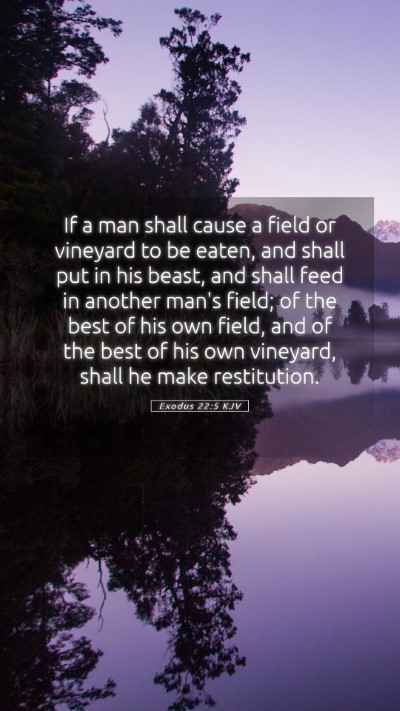Understanding Exodus 22:5: A Comprehensive Commentary
Exodus 22:5 states:
"If a man shall cause a field or vineyard to be eaten, and shall put in his beast, and shall feed in another man’s field; of the best of his own field, and of the best of his own vineyard, shall he make restitution."
Overview of Exodus 22:5
This verse addresses the issue of property damage and restitution in ancient Israelite society. It indicates how one should compensate for damages done to another person's property, particularly in terms of agricultural loss.
Insights from Public Domain Commentaries
Matthew Henry's Commentary
Matthew Henry emphasizes the moral responsibility of individuals to be accountable for their actions. In his analysis, he points out that this verse illustrates the principle of ensuring that one’s actions, even if unintentional, do not harm others financially. Henry underscores the importance of restitution as not just a legal obligation but a moral one that upholds social justice.
Albert Barnes' Notes
Albert Barnes elaborates on the idea of restitution in his commentary. He notes that the requirement for making restitution from the best of one's own field signifies the need for sincerity and adequacy in compensation. Barnes explains that this law not only promotes fairness between neighbors but also encourages a communal sense of responsibility. The notion of 'the best' indicates that restitution should reflect the value of the loss incurred by the victim.
Adam Clarke's Commentary
Adam Clarke focuses on the practical implications of this law. He interprets that this provision is designed to deter negligence among individuals, urging them to be mindful. Clarke also mentions that such laws reflect God’s concern for justice and the protection of property rights within the community structure. His analysis portrays this verse as an essential guideline for maintaining harmony in society.
Significance and Application
The significance of Exodus 22:5 extends beyond its immediate context. The principle of making amends is pivotal in understanding ethical behavior in Scripture. It teaches individuals how to honor their responsibilities and maintain integrity in their relationships. This is especially relevant in today's context, where disputes over property and damages continue to arise.
Key Themes in Exodus 22:5
- Accountability: Every individual is responsible for their actions and must take measures to rectify any harm caused.
- Restitution: Compensation should be made not merely in any form but should reflect the true value of what is lost.
- Community Harmony: The need for these laws illustrates God’s desire for peaceful cohabitation and mutual respect within communities.
Cross References
- Leviticus 6:4-5 - Discusses restitution for theft.
- Proverbs 6:30-31 - Reflects on the consequences of stealing and the importance of restitution.
- Luke 19:8 - Zacchaeus declares he will restore fourfold to anyone he has cheated, illustrating a New Testament application of restitution.
Conclusion
Exodus 22:5 serves as a profound reminder of the importance of accountability and the moral imperatives that govern our interactions with others. In engaging with this scripture, one can gain significant insights into biblical justice and the ethical standards to which all should aspire. Such understandings enhance our appreciation of Bible verse meanings and interpretations, providing deeper Bible study insights for individuals and groups alike.


